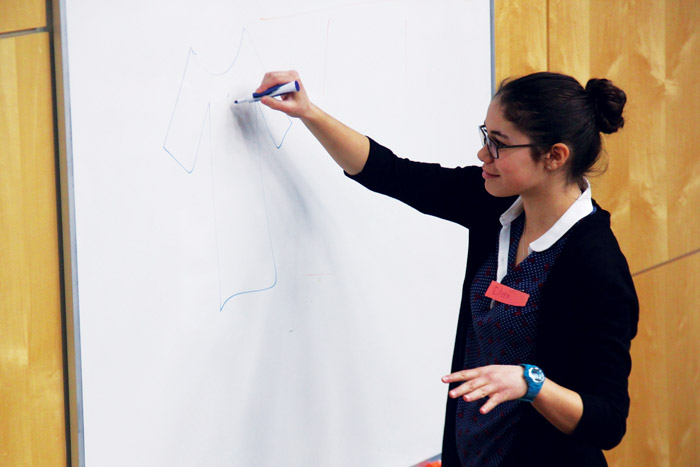On April 2, deep within the Montreal Neurological Institute (MNI), Villa Maria 10th grader Melina Thibault was declared Montreal’s annual Brain Bee champion.
The competition, hosted by Brain Awareness Montreal (BAM), is designed to test high school students specifically on information about the brain.
The day began with a written portion whereby students were asked to answer neuro-trivia questions. Later in the day, small groups of students were asked to diagnose an unknown mental illness based on a given set of symptoms. Students were also given the opportunity to ask brain experts about their research, and could even touch, hold, and ask questions about a preserved human brain.
After hours of trivia on neural anatomy, brain physiology, and neurotransmission, only Thibault and co-finalist 10th grader Tiffany Mach remained.
In order to win, a contestant had to correctly answer three questions before the other contestant. The questions fired at a rapid pace.
“Which of the two glutamate receptors do we know [the] most about [that] are often thought of as […],” started Helene Vallieres, co-vice president of BAM’s Brain Bee.
“Memory molecules,” interjected Thibault, delivering the right answer. “NMDA and AMPA receptors.”
Many of the Brain Bee contestants have studied so thoroughly that they are often able to predict the right answer, before the judges have even finished the question.
Third-place winner Villa Maria 10th grader Laura Lentini explained that she came across a question that didn’t make sense to her, or the BAM volunteers who help contestants study. Instead, Lentini offered up an explanation.
“They were all surprised because they didn’t know [the answer to the question],” said Lentini. “And they thought it was harder than [any] question they had asked before.”
Contestants from schools around Montreal study with the help of BAM volunteers. The neuroscience mentors offer study advice and answer the questions of contestants.
“The mentors were really amazing,” Thibault said.
One of six students chosen by a committee of teachers at Villa Maria, Thibault explained that her mentors played a huge role in her success. By taking detailed notes on a bilingual book BAM provided to participating schools, Thibault studied key concepts and bolded words.
“[The book] has facts about the brain,” explained BAM Brain Bee Co-Vice President Stephanie Scala, a McGill neuroscience graduate student. “It covers neurodegenerative disorders of the mind, to basic things like the anatomy of the neuron.”
With the help of the MNI, Brain Bee was able to secure a room and food for everyone who attended. Though Scala and Vallieres reached out to schools all over the island, only a few schools responded, including the all-girls schools Villa Maria— where Mach and Lentini also attend—and The Study in Westmount.
“We’re open to boys and girls,” said Scala. “But the majority tend to be girls, which is really great because it gets them interested in science.”
The Brain Bee is just one event in an ongoing effort by BAM to raise awareness and interest in neurological affairs.
“It’s [just] a good way to spark an interest in neuroscience,” Vallieres explained.
Following the Canadian finals at McMaster University on May 31, students will have the chance to compete internationally in Australia this summer.









